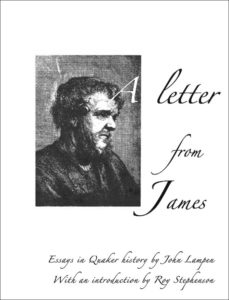A Letter from James: Essays in Quaker History
Reviewed by Thomas Hamm
June 1, 2017
 By John Lampen. The Hope Project, 2016. 107 pages. Free digital download available at hopeproject.co.uk.
By John Lampen. The Hope Project, 2016. 107 pages. Free digital download available at hopeproject.co.uk.
Free digital download at Hope Project
Many Friends will be familiar with Friend John Lampen as one of the most thoughtful, and readable, Quakers writing today. This collection of essays ranges broadly over Quaker history. But the history has applications that Lampen wants contemporary Friends to understand.
Aside from the introduction and conclusion, this little book has nine chapters: “George Fox and the Child,” “John Woolman’s Dreams, “The Witness of Job Scott,” “Speaking Truth to Power (1),” “The Grimke Sisters,” “Tolstoy’s Last Novel,” “Schooling & the Peace Testimony,” “Speaking Truth to Power (2),” and “A Letter from James,” which deals with James Nayler. Some are more original and provocative than others, although all are well worth the time needed for a close reading.
Lampen is quite willing to take up awkward topics. The opening essay, on George Fox, notes the accounts Fox left in which he claimed to have been the instrument of miraculous divine healings. Friend John is particularly incisive in his reading of the journal of the eighteenth-century New England Friend Job Scott, which he sees as the record of the life of a Friend devoted to utter self-abnegation, convinced that he could do no good thing, even offer a prayer, unless it was in obedience to clear divine guidance. Probably the most piquant essay deals with the role that English Friends played in the publication of Leo Tolstoy’s last novel, Resurrection. Banned in Russia, it was issued by Headley Brothers, the London Quaker publishing house. Friends greatly admired Tolstoy as a pacifist and great Christian soul. They were appalled, however, when they actually read the novel and discovered that at the heart of its narrative was the seduction of a servant girl and her subsequent life in prostitution. (There is much more to Resurrection than this. But these facts were enough to cause uniformly prim Friends to distance themselves.)
For me, the two most meaningful essays deal with peacemaking. Many contemporary Friends will be disturbed to learn that corporal punishment was once widely used in Friends schools. But Lampen also tells a moving story of innovative Quaker teachers who introduced methods of peacemaking into their schools in the past half-century. Particularly relevant today is Lampen’s account of the work of Corder and Gwen Catchpool in Berlin in the 1930s. Their commitment to seeking the Light in all meant that they befriended Nazis and even Gestapo officials, using those contacts to win occasional release of a political prisoner. Their experiences taught them the dangers of unrelenting moral indignation: “If you allow yourself to remain in it, it is a sort of selfish luxury. You may come to rejoice in hearing more evil of the wrong-doer.” That is an exhortation Friends may want to ponder in the next few years.
Lampen worries that Friends are losing sight of their history. His stories remind us how precious that history is.



Comments on Friendsjournal.org may be used in the Forum of the print magazine and may be edited for length and clarity.